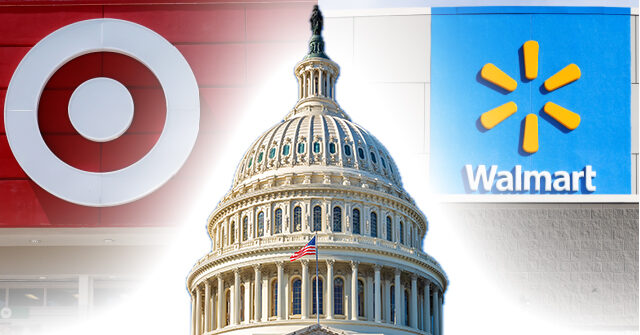
The Durbin-Marshall credit card bill is just another way for corporate mega-stores to benefit, while already struggling business owners and consumers pay the price.
The post Retailer Retaliation: Mega-Stores Use Government to Weaponize Political Power appeared first on Breitbart.

The following content is sponsored by the Electronic Payments Coalition.
Small businesses are the backbone of our economy, employing nearly half of the U.S. private sector and accounting for nearly two-thirds of all new American jobs for the last two decades.
While their impact is unquestionable, the challenges small business owners face continue to arise at every turn, especially as giant corporate mega-stores wield considerable influence and resources – or in this case, harmful legislation.
Through their credit card bill, Senators Dick Durbin (D-IL) and Roger Marshall (R-KS) are proposing to alter the credit card routing system to, as they claim, “boost competition.” In reality, it will fundamentally alter our current safe, secure, and hassle-free system by introducing untested alternative networks. They claim the use of such networks will allow retailers to cut costs and in turn pass these savings on to consumers.
But recent research findings from the University of Miami show otherwise. The report found that consumers and small business owners will not benefit from this bill at all; rather, they will bear the brunt of the bill’s fallouts, all while Durbin and Marshall’s mega-store allies, like Walmart and Target, will gain millions.
According to the study, America’s top 100 retailers could see a benefit of nearly $3 billion, with $1.2 billion going to the top five largest retailers alone. So, where do businesses with less than $500 million in sales fit in?
The report shows that mom-and-pop shops would not only miss out on benefits – they would also lose out on their own rewards. Small business operators receive roughly $12 billion in credit card rewards when they make purchases on their own forms of credit.
This bill jeopardizes credit card rewards programs that both businesses and consumers heavily rely on. By skyrocketing costs and threatening these heavily-relied on cash back, points and rewards programs, already struggling Americans would feel an even tighter financial strain.
This legislation is just another way for corporate mega-stores to benefit, while already struggling business owners and consumers pay the price.
Other industries recognize this bill for what it is – a threat to consumers, our economy and our entrepreneurial communities. Yet, when these individuals attempt to speak out against the legislation, they only face further threats and harm.
Recently, a study from Airlines for America (A4A) found that the Durbin-Marshall credit bill would significantly harm the travel and tourism industry and the economy at large, with a total expected loss of $23 billion. Many Americans rely on credit card rewards and loyalty points to travel and can simply not afford to lose these benefits.
Naturally, the group expressed its opposition to the legislation. In response, Senators Durbin and Marshall have launched a retaliatory campaign, pressing the Transportation Department and the Consumer Financial Protection Bureau (CFPB) to monitor the airline industry’s alleged “deceptive practices in frequent flyer and loyalty programs.” (Despite the fact that only a few years ago, Sen. Marshall criticized others for the exact same thing through the Don’t Weaponize the IRS Act.)
The Senators’ efforts to weaponize their own political power, and that of the federal government, only underscore their blatant disregard for the interests of the American people and willingness to do whatever is necessary in helping their corporate mega-store allies.
Despite the bill’s narrative, Americans must know the truth – this bill will not help consumers or small businesses. Only corporate mega-stores and the Senators they have in their pockets stand to benefit a dime. Let’s put a stop to this bill once and for all.




